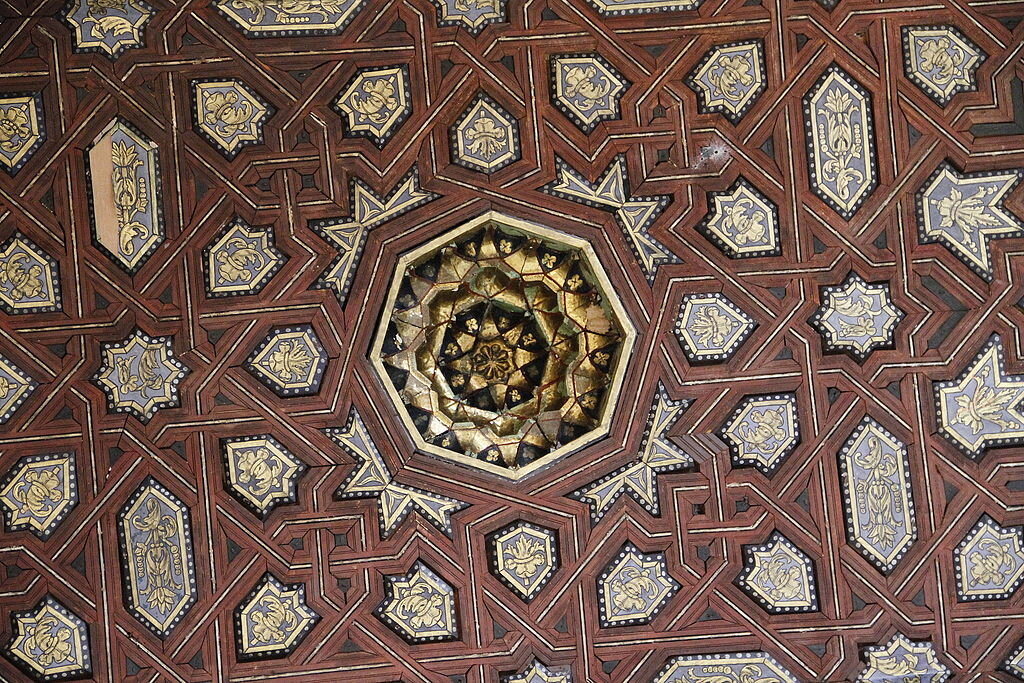Uthman ibn Affan, as he was also known, created the definitive version of the Quran and greatly improved the Islamic Empire’s infrastructure.
Othman accomplished quite a bit during his time as khalifa — until he was brutally murdered by a mob.
The Prophet Mohammed had been dead for only 12 years, and already the religion he founded, Islam, was on its third leader, or khalifa.
“Staggering wealth, dazzling beauty, two of the Prophet’s daughters for wives — what did this man lack?”
This painting depicts the election of Othman as the third khalifa of the budding religion of Islam.
The Third Khalifa: Othman
Othman (aka Uthman ibn Affan or Osman) was distantly related to Mohammad, as his fifth cousin once removed. Taking office at the age of 68, he was khalifa from 24-40 AH (644-661 CE).
His father had been one of the richest men in Mecca, and Othman multiplied his family’s fortune many times over, earning him the nickname Othman the Wealthy.
He didn’t drink, he didn’t smoke, what did he do? Well, he also didn’t chase women — despite being known as quite the hottie.
Conversion and Repentance
Othman’s conversion to Islam didn’t go over well with his family, which was rabidly anti-Muslim. In fact, his stepfather had once tried to strangle Mohammed to death but was prevented by Abu Bakr. His two wives refused to convert, so he divorced them and married Mohammed’s gorgeous daughter, Ruqayya. After she died, Othman wed another of the Prophet’s daughters, Umm Kulthum.
“Staggering wealth, dazzling beauty, two of the Prophet’s daughters for wives — what did this man lack?” asks Tamim Ansary in Destiny Disrupted: A History of the World Through Islamic Eyes. “And yet Othman seemed haunted by the fear that he was not good enough. He spent much of his time fasting, praying and reading the Qur’an. Perhaps his extravagant donations to the public good were attempts to deserve the extraordinary good fortune he already enjoyed.”
For instance, to make up for abandoning a battlefield after a rumor spread that Mohammed had been killed, Othman would buy slaves and free one every Friday.
For some reason, Othman decided to organize the verses of the Qur’an according to length — and that’s how the holy book remains to this day.
Shaping the Qur’an, Launching Massive Building Projects
The first big project Othman undertook was to create a definitive edition of the Qur’an. Scholars eliminated redundancies, resolved discrepancies and evaluated dubious passages. The final product was a book in which the verses were pretty much arranged according to length, rather than thematically or chronologically. That doesn’t seem like the best way to organize a holy book, but there you go.
Othman’s policies greatly benefitted his own clan, the Umayyads, forming a powerful dynasty, seen here at the siege of Constantinople.
Another contentious decision Othman made was to lift Omar’s restrictions on Muslims buying land in conquered territories. In fact, wealthy Muslims could borrow from the public treasury to finance these purchases. Soon a class of elites, many from his own clan, the Umayyads, had acquired immense estates throughout the new empire.
Othman’s construction projects must have gone over better with the public. He built more than 5,000 mosques, prettied up Medina, dug canals, constructed highways, improved irrigation systems, upgraded ports, and installed wells and water systems.
Of course, he also constructed himself a lavish palace — though within it, he “lived on bread, water and prayer,” Ansary says.
The tomb of Othman in Jannat al-Baqī’, the first Islamic cemetery, found in Medina
The End of Othman
Othman had set up his foster brother as governor of Egypt, but the man tried to squeeze too much money out of the people. A delegation petitioned Othman to remove the man as governor, which he agreed to.
On their way back to Egypt, members of the delegation spotted a suspicious-looking slave of the khalifa and searched him. They discovered a letter telling the governor to arrest and execute them upon their return.
The delegation turned around and marched into the palace. When they showed Othman the letter, he expressed shock and said he had never seen it before. This might indeed have been the case, but the once-peaceful petitioners had devolved into an angry mob.
“[T]he rioters worked themselves into a frenzy, broke down palace doors and burst in with a roar. They found the khalifa in his study, and there in the flickering twilight of the old man’s lamp, in year 34 of the Muslim era, they beat their own leader to death,” Ansary writes.
It was an ignominious end to the life of one of the most influential early leaders of Islam. –Wally










































